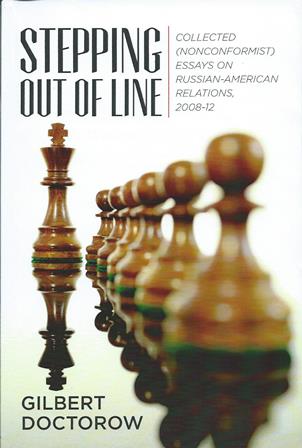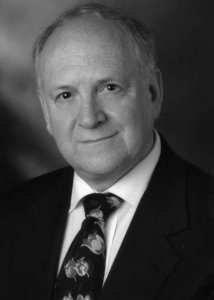
Published 3-07-2013, 06:43
 by Vlad
Sobell, Professor,
New York University, Prague
by Vlad
Sobell, Professor,
New York University, Prague
Link to the book:
After the collapse of the Soviet Union in 1991, the West had an historic opportunity to integrate Russia into a reconstructed Euro-Atlantic security system. The tantalizing prospect emerged to include Russia, just like Germany and Japan generations earlier, in the community of prosperous and democratic nations. The re-fashioning of the huge resource-rich Eurasian landmass – Halford Mackinder’s "Heartland” – spanning the EU, Central Asia and China into an integral part of the Atlantic alliance would have finally established the foundations for lasting peace on the European continent. The sacrifices made by all nations, not only during the Cold War but, above all, in the horrific military conflicts that preceded it, would not have been in vain.
Unfortunately, this historic opportunity was not seized. On the contrary, just when Russia’s reformers were engineering that country’s peaceful transition to democracy and market economy, the West seemed to run out of resolve and vision. Instead of providing the requisite economic aid (whatever it may have taken) to help reconstruct Russia and enlist it as a member of NATO, the US-led West embarked on a path that resulted in Russia’s exclusion. An enlarged Euro-Atlantic security alliance (along with the EU) moved towards Russia’s Western borders, leaving Russia at best out in the cold and at worst faced with a new threat. Today, Europe is divided once again and new cold war is de facto being waged (if not the old Cold War being perpetuated by other means).
To understand the causes of this catastrophic geopolitical failure it is necessary, in the first instance, to examine the inner workings of Western democracy. Why did America’s think tanks, academics and pundits – so often at the cutting edge of critical inquiry –not provide policy prescriptions that might have prevented this outcome? And why have successive US administrations over the past two decades failed to implement policies that might have kept Russia on board come what may? Just what exactly has gone wrong?
Those searching for answers to these crucial questions will benefit hugely from reading the essays by Gilbert Doctorow – a seasoned Russia watcher with a number of academic accolades to his name, including a Ph.D. in history from Columbia University – collected in this volume. Moreover, this book should not be missed by anyone with an interest in current European affairs and US-Russia relations.
As the author notes in the Foreword, America’s policy toward post-communist Russia has been characterized by a rare display of virtually total bi-partisanship and hence the absence of any fruitful dialogue within the policy-making establishment. While Washington’s policy towards the likes of China or Iran at least benefits from a healthy debate in which diametrically opposed points of view are aired, its policy towards Russia "appears to be frozen in time, without any public controversy”. Doctorow sets himself the task of breaking with this "unnatural state of affairs” by "stepping out of line” and publishing a selection of his "non-conformist” essays.
Regardless of whether Doctorow’s readers agree with his analyses and conclusions, this collection of his essays is an admirable and important feat in its own right. Surely, the ability to break out of the confines of a prevailing orthodoxy is the very essence of open society (in the Popperian sense) and an indispensable ingredient for a healthy democracy. But as Doctorow shows, something must have gone badly wrong when, as he writes (p. 6), senior US professors and those in charge of prestigious research institutions and publications complain about "closed minds” within the American policy establishment but do so "only in the privacy of their offices”, thereby giving the establishment "the finger in one’s pocket” without daring to do so openly.
Does the US establishment suffer – at least insofar as its policy towards Russia is concerned – from the deadly virus of a closed society (Popper once again)? And why does such an astute and widely respected commentator as Doctorow need to style his commonsense observations about Russia as "non-conformist essays” and call this essay collection "Stepping out of line”? Surely, in a thriving democracy, non-conformism and stepping out of line should be part of the norm, while conformism and "pulling the line” is the very essence of totalitarianism. The very appearance of this book is thus a welcome event for everyone concerned with the health of Western democracy.
A salient theme of Doctorow’s essays is that the current worrisome state of affairs in US-Russia relations is due chiefly to the contamination of America’s foreign policy discourse by neocon ideology. Since the end of the Cold War this revisionist creed, born out of left-leaning thinkers’ disillusion with Soviet communism, has spread among both sides of the US political divide, mainly because of its appeal to idealism, which goes back to America’s Founding Fathers. Add to this already potent brew post-Cold War triumphalism, the US’s unrivalled military might and the inherent Russophobic bias of the neocon philosophy, and you get the makings of the stultifying orthodoxy against which Doctorow is taking a stand. America believes its manifest destiny is to reshape the world in its likeness. And those who resist the march of History are fighting a losing battle – as Francis Fukuyama famously argued in his "End of History”, published in 1992. In any case, the opponents of progress will sooner or later be crushed by America and its allies.
What is more, the terrorist attacks of 9/11 wounded the lone global hyper-power, making the prevailing atmosphere more oppressive. As a result, "stepping out of line” has become much riskier.
Beyond the policy making establishment, the simplistic, black-and-white precepts of the idealistic neocon ideology have had deleterious consequences for America’s academia and, by extension, in disciplines such as journalism, politics, diplomacy and finance. It has encouraged a shift from traditional fact-based learning to the parrot-like but more lucrative pursuit of "democracy promotion”: to put it bluntly, demonstrating an uncritical commitment to America’s drive to "democratize the world” has become more important for one’s career than understanding what makes diverse "undemocratic” cultures tick. Cultural and political idiosyncrasies, which are un-American and hence by definition un-democratic, are to be swept aside.
And from here we return to the US-led West’s mismanagement of its relations with post-communist Russia. For several reasons, Russia has inadvertently become the most awkward post-Communist country to deal with. To start with, Russia is not a "country” but a sprawling Eurasian empire with an oversupply of idiosyncrasies, including its long-standing and deep commitment to sovereignty. It is also the only nuclear power that can claim a degree of parity with the US. And since Russia was at the core of the Soviet Union, it was always a non-starter trying to turn it into a pliant US ally.
This means that America could have peacefully integrated Russia into its Alliance only by treating it as an equal partner with full respect for its need to pursue its own path to democracy. But such a scenario was made impossible by the neocon orthodoxy, which leaves no room for compromise. You either become like America – and not object to being led by it – or be damned as an autocrat.
Doctorow’s thoughtful essays contained in this collection, which were penned during the period 2008-12 but are arranged in backward chronological order, offer many insights into the momentous clash between the irresistible force of America’s neocon-fuelled revisionist drive and the immovable object of Russia’s post-Communist conservatism and embrace of stability. Written in an unpretentious but refined style, they address a range of diverse topics, including the intellectual legacy of George F. Kennan, the father of the successful containment strategy; recent developments in Russia’s domestic politics and its relations with the US, EU and NATO [1]; President Obama’s "reset”; and US/EU gas pipeline geopolitics.
But despite this diversity, there is a common thread running through the essays: the illustration of the roots of the US/West’s misconceived stance towards Russia and its implicit costs. At the same time, Putin’s Russia is portrayed as a post-totalitarian and post-imperial power on the defensive and preoccupied with its recovery and the preservation of internal stability and territorial integrity.
To the author’s credit, while not trying to conceal where his sympathies lie and always calling a spade a spade, he does not force his views upon the reader and has a tendency towards understatement. Doctorow certainly belongs to the increasingly rare breed of scholars who prefer to reveal the essence of conflicting viewpoints and allow the reader to make up his/her own mind. Equally, he sees no conspiracy in Washington’s misguided conduct; instead he recognizes a worrying failure of democracy. Indeed, despite his evident sympathy for Putin’s Russia, Doctorow speaks from the perspective of a loyal American and convinced democrat who bemoans the shortsightedness of his country’s political and intellectual class.
***
[1] I have some reservations about one of Doctorow’s major themes, namely that Russia should be – or should have been – admitted to NATO. I cannot imagine such a scenario materializing/ever having materialized – not least because were Russia to join NATO, the alliance would have to be reformed beyond recognition. Rather than integrating Russia into the US-led West, the solution would surely be to create a new overarching security structure in which Russia and the West participate as equal partners. Indeed, Moscow has pushed for just such a solution – especially during the brief Medvedev presidency (2008-1012). But unfortunately its proposal has been completely ignored by Washington and other Western capitals. And, to my mind, this is where the shortsighted neocon triumphalism has inflicted the greatest damage.



_jpg/250px-ElbeDay1945_(NARA_ww2-121).jpg)







